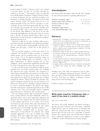 7 citations,
August 1989 in “The Journal of Dermatologic Surgery and Oncology”
7 citations,
August 1989 in “The Journal of Dermatologic Surgery and Oncology” Facelifts can lead to high patient satisfaction and a quick recovery when done correctly.
[object Object]  11 citations,
December 2020 in “Notulae botanicae Horti Agrobotanici Cluj-Napoca”
11 citations,
December 2020 in “Notulae botanicae Horti Agrobotanici Cluj-Napoca” Mycorrhizal fungi and shading improve tea plant growth and nutrient uptake by changing hormone levels and gene expression.
3 citations,
January 2021 in “Journal of dermatology & cosmetology” Current alopecia treatments manage symptoms but don't cure, and better treatments are needed.
 December 2018 in “DergiPark (Istanbul University)”
December 2018 in “DergiPark (Istanbul University)” The cat's skin condition improved with treatment, but underlying health issues must be addressed.
 7 citations,
January 2019 in “Pharmaceutical Biology”
7 citations,
January 2019 in “Pharmaceutical Biology” Eclipta prostrata helps hair growth and maintains the growth phase by affecting certain growth factors.
 18 citations,
September 2011 in “Livestock science”
18 citations,
September 2011 in “Livestock science” Maternal Nano-Se supplements improve fetal hair follicle development in cashmere goats.
 140 citations,
August 2011 in “Biomaterials”
140 citations,
August 2011 in “Biomaterials” Keratose, derived from human hair, is a non-toxic biomaterial good for tissue regeneration and integrates well with body tissues.
269 citations,
October 2018 in “International journal of biological macromolecules” Hyaluronic acid is effective for skin rejuvenation and should be a key ingredient in cosmetic products.
 April 2024 in “Current journal of applied science and technology”
April 2024 in “Current journal of applied science and technology” The organic hair ointment is safe, promotes hair growth in male rabbits, and has good stability and pH for human use.
 July 2024 in “Journal of Cosmetic Dermatology”
July 2024 in “Journal of Cosmetic Dermatology” Vegan collagen builder improves hair growth, skin smoothness, and reduces wrinkles and pain.
 January 2018 in “Springer eBooks”
January 2018 in “Springer eBooks” Athletes need effective management of skin disorders for their performance and well-being.
 42 citations,
April 2008 in “Acta materialia”
42 citations,
April 2008 in “Acta materialia” Different ethnicities and treatments affect human hair strength and structure.
 21 citations,
July 2017 in “Journal of Cosmetic and Laser Therapy”
21 citations,
July 2017 in “Journal of Cosmetic and Laser Therapy” Vesicular carriers like liposomes may improve cosmetic skin treatment delivery and effectiveness but need more human research.
 1 citations,
July 2017 in “Journal of Pharmacognosy and Phytochemistry”
1 citations,
July 2017 in “Journal of Pharmacognosy and Phytochemistry” The study concluded that standardizing Thuja orientalis bark helps in its identification and quality control.
 19 citations,
August 2010 in “Journal der Deutschen Dermatologischen Gesellschaft”
19 citations,
August 2010 in “Journal der Deutschen Dermatologischen Gesellschaft” Certain plant extracts can effectively treat skin conditions like athlete's foot, chronic vein problems, sun damage, skin growths, vitiligo, and hair loss, and may also improve skin appearance.
 8 citations,
April 2015 in “British Journal of Dermatology”
8 citations,
April 2015 in “British Journal of Dermatology” White piedra, a rare fungal infection, was diagnosed in two women in a northern climate.
 202 citations,
June 2005 in “Aaps Pharmscitech”
202 citations,
June 2005 in “Aaps Pharmscitech” Lecithin organogels could be good for applying drugs to the skin because they are stable, safe, and can improve drug absorption.
 January 2017 in “Journal of Cosmetics, Dermatological Sciences and Applications”
January 2017 in “Journal of Cosmetics, Dermatological Sciences and Applications” Chinese women's hair gets thinner and grayer with age, and scalp conditions change, especially after 40.
 111 citations,
March 2012 in “Expert Opinion on Drug Delivery”
111 citations,
March 2012 in “Expert Opinion on Drug Delivery” Liposomes could improve how skin care products work but are costly and not very stable.
 22 citations,
August 2011 in “Journal of Supercritical Fluids”
22 citations,
August 2011 in “Journal of Supercritical Fluids” Rice bran extract might help prevent hair loss.
 11 citations,
January 2023 in “BioMed Research International”
11 citations,
January 2023 in “BioMed Research International” Microbial biosurfactants could be a safer and environmentally friendly alternative to chemical surfactants in cosmetics.
 December 2022 in “International Research Journal Of Modernization In Engineering Technology And Science”
December 2022 in “International Research Journal Of Modernization In Engineering Technology And Science” Cosmeceuticals are special products that improve skin and hair health and have benefits like treating acne and wrinkles, protecting from the sun, and helping with dandruff and hair growth.
 January 2023 in “Journal of pharmacognosy and phytochemistry”
January 2023 in “Journal of pharmacognosy and phytochemistry” Herbal home remedies can effectively treat hair loss with fewer side effects.
[object Object]  October 2023 in “International journal of research in Ayurveda and pharmacy”
October 2023 in “International journal of research in Ayurveda and pharmacy” Keedari thailam is effective for treating alopecia areata and has multiple health benefits.
 January 2025 in “International Journal of Women’s Dermatology”
January 2025 in “International Journal of Women’s Dermatology” Dermatologists need better training on ethnic hair care to improve patient care and satisfaction.
 7 citations,
May 2022 in “International Journal of Environmental Research and Public Health”
7 citations,
May 2022 in “International Journal of Environmental Research and Public Health” Isotretinoin therapy for acne can cause many reversible side effects, mainly mild skin conditions, and patient understanding of these effects can improve treatment adherence.
 21 citations,
October 2011 in “PloS one”
21 citations,
October 2011 in “PloS one” Certain molecules in hair change with age and could be used for cosmetic treatments.
November 2019 in “SLAS technology” New findings suggest certain genes and microRNAs are crucial for wound healing, and innovative technologies like smart bandages and apps show promise in improving treatment.
 July 2018 in “Plastic and Aesthetic Nursing”
July 2018 in “Plastic and Aesthetic Nursing” The 2018 ISPAN Meeting emphasized hands-on learning, patient safety, and professional growth in medical aesthetics and reconstructive practices.
 45 citations,
September 2011 in “Journal of the European Academy of Dermatology and Venereology”
45 citations,
September 2011 in “Journal of the European Academy of Dermatology and Venereology” Obese people have more skin problems like stretch marks and infections, which get worse with higher obesity levels.



























